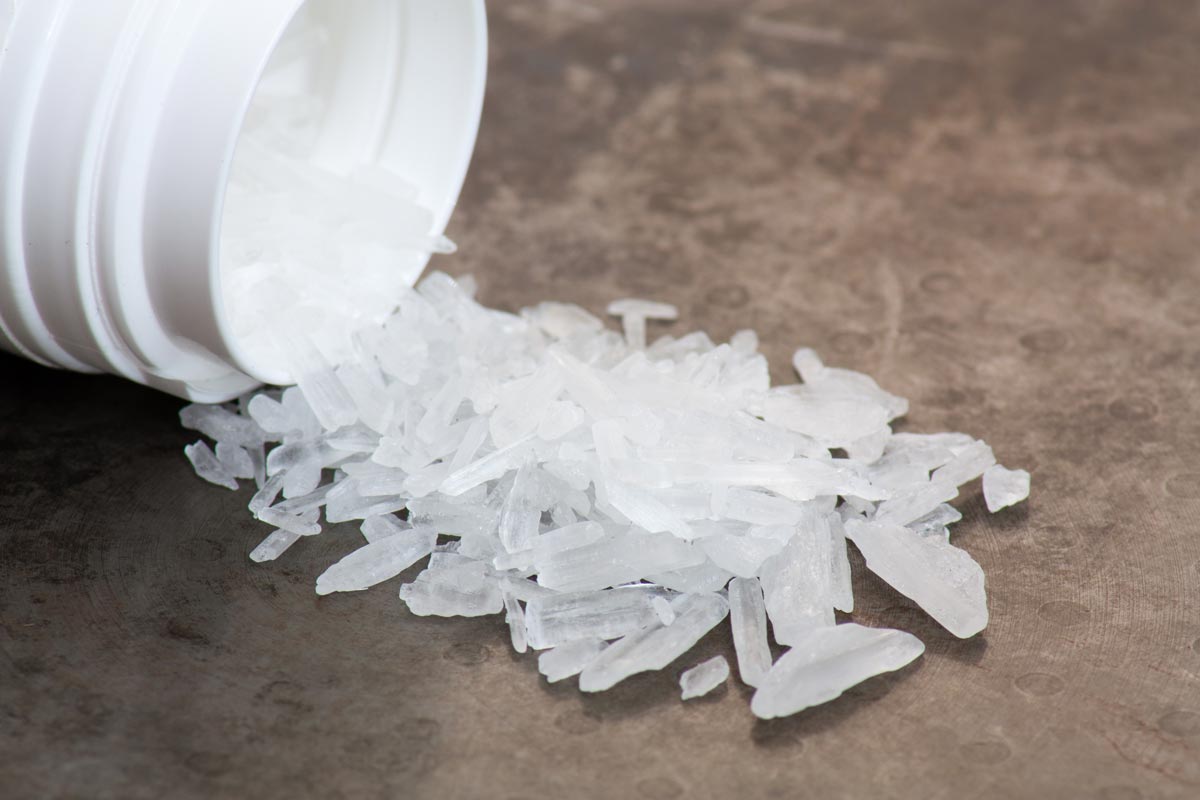
The National Survey on Drug Use and Health shows that 2 million Americans use meth regularly. A further 1 million of those are estimated to be addicted to the drug – representing some 0.4% of the total U.S. population. Amphetamines including meth and crystal meth are widely regarded as the most dangerous and most addictive drugs on the market. Yet, millions of Americans regularly use it, often recreationally, despite damaging effects including muscle deterioration, teeth deterioration, mental health problems, and the high risk of chemical dependence and addiction. If you or a loved one is using meth, it’s likely obvious. If they are addicted, you’ll likely easily be able to see that they have a problem. And, those symptoms will show up considerably before that person is fully addicted.
While you may not be able to recognize that they are addicted to methamphetamine versus another drug without specific symptoms, people make it obvious when they are using – often because their behavior, patterns, and interactions completely change. That’s probably why you’re reading this. The following signs and symptoms are characteristic of meth addiction, and you can use them to identify addiction before taking the problem to a medical professional or a rehab center.
Signs and Symptoms of Methamphetamine Use
The first step to identifying a methamphetamine addiction is normally to identify that it’s meth at all. In some cases, your loved one may exhibit extreme behavior changes following a shift in a mental disorder. Mental health problems such as schizophrenia, bipolar disorder, and panic disorders can result in extreme personality shifts and weight loss. Substance use disorders themselves are mental health disorders, which can and should be treated by a medical professional.
However, meth use is very recognizable and normally shows the following characteristics:
- Energy and alertness, usually lasting as long as 12 hours. Someone who takes meth before bed cannot sleep and will continue to stay awake as long as they take the drug
- Dilated pupils
- Increased confidence
- Increased motivation
- Jitters and shakiness
- Manic behavior
- Heightened blood pressure and palpitations
- Sweating
- Inability to eat or loss of appetite
- Insomnia or sleeplessness
- Paranoia
- Irritability
- Nausea
- Dry mouth
- Bad breath
- Headaches
- Jaw clenching and grinding teeth
- Persistent cold and flu symptoms
- Runny nose
- Red eyes
- Fatigue
- Depression
These symptoms will start out mild when someone first starts using. In most cases, they use a small amount of the drug and don’t’ have any of the drug in their system. The longer they use, the worse these symptoms will get – because they use more and have more of the drug left in the system.
In most cases, you can also clearly track excitability, violence, and erratic behavior as starting about 15 minutes after they take a dose.
Get Your Questions Answered
Our expert & caring staff on site are available 24/7. Call us today.
Signs and Symptoms of Meth Addiction
When someone uses meth over time, they become chemically dependent. This means the body adjusts to the substance and the same dose achieves less. Eventually, the user has to take considerably larger quantities and at more frequency to get the same results. That results in behavioral changes and behavioral maladaptation. That’s especially true with methamphetamine, which normally causes a considerable crash after it wears off. Users who want to remain functional have to keep using or they crash – often for as long as three days. Eventually, with prolonged use, individuals develop mental and physical signs of addiction.

Physical Signs of Meth Addiction
Most people quickly begin to develop physical side effects. These start out small and increase over time. However, most can be extremely visible after only a few months. In most cases, if you notice physical symptoms, you’ll assume your loved one is ill. They may even explain symptoms away as an illness.
- Weight loss, sometimes rapid and extreme
- Yellowing skin
- Skin sores and red patches
- Yellowing teeth, rotting teeth
- Repetitive motions, scratching, tics, twitches
- Loss of personal hygiene habits
Meth users very often develop tics and rhythmic movements, such as tapping, twitching, scratching, and jumping. These can be rhythmic, but are often jerky and erratic.
Teeth Problems – Teeth problems are one of the most telling signs of meth addiction. “meth mouth” happens through a combination of dry mouth, teeth grinding, and poor impulse control while addicted, resulting in urgers for extreme sugar highs. The result is that many meth users drink large quantities of sugary beverages, cause significant damage to the teeth by grinding them, and cause significant damage to the teeth with dry mouth syndrome. The result is a fast and noticeable degradation of the teeth.
Weight Loss – Weight loss is the second most common symptom of meth addiction. If someone is overweight to begin with, this can take time to notice. But, it quickly becomes problematic as individuals don’t eat enough throw up what they do eat, and burn through calories very quickly. The result can be shocking, even in a few months. Addicts may become very thin, they may become gaunt looking, and they may simply lose weight at a pace that is not consistent with their diet or exercise. E.g., you know they still consume 2 liters of soda a day – they would not normally be losing weight at this pace.
Sleeplessness – If someone is using meth regularly, they will have very erratic sleep schedules. Some might not actually sleep for days. Afterwards, they’ll crash, sometimes for days. If your loved one has extreme patterns of hyperactivity and sleeplessness and then sleeps for several days at a time, they likely have a problem, even if it’s not meth.
Psychological Symptoms of Meth Addiction
Psychological symptoms of meth addiction can be more noticeable and more shocking than the physical side effects. That’s important, because meth users become violent, agitated, paranoid, and twitchy – even when only using occasionally. The longer they use, the more extreme these symptoms become, as meth physically changes the shape of the brain.
These include:
- Memory problems
- Motor skill impairment
- Reduced pleasure in normal activities
- Impaired visual memory
- Personality changes
- Paranoia (sometimes extreme)
- Twitching and scratching
- Psychosis (Hallucinations, delusions, extreme paranoia)
- Manipulative behavior
- Depression
- Increased anxiety
- Inability to tell real life from paranoia
- Increased irritability
- Increased agitation
- Increased violent reactions
- Lack of impulse control
Eventually, these mental symptoms can become so severe that the person you are with is scary to be around. Violent and sudden impulses can result in broken dishes, in abuse, and in someone behaving in a way that is dangerous to themselves and others.
Additionally, someone who is very heavily addicted will “tweak”. This is the process of staying up for several days, sometimes weeks, and experiencing the severe side effects of not doing so. Someone who is tweaking will display rhythmic jerking (especially of the eyes), may walk as though drunk, will talk in a fast and nonsensical way, and will jerk and stumble. If your loved one is in this state it is important to get them to the hospital, as they may collapse and suffer organ failure.
Getting Help
If your loved one is struggling with meth, they are at risk. Meth addiction is harmful to the body, to the mind, and to everyone around you. Individuals with a meth addiction have a mental health disorder and a chemical dependence on a drug and they will prioritize that over any rational decisions. But, even though meth changes the brain, recovery is possible. If your loved one goes into treatment, they will begin to heal and will recover their full health within a few years.
Today, meth addiction is treated with a specialized meth addiction treatment program that includes medical detox, behavioral therapy, and counseling – designed to help your loved one understand what pushed them to substance abuse, to help them build skills to be happy without substance abuse, and to combat the psychological damage caused by meth to begin with. If you or a loved one needs help, it is there, and it works.
If you or your loved-one struggles from substance abuse please contact us today and speak with one of our experienced and professional intake advisors. We’re here to help you recover.






